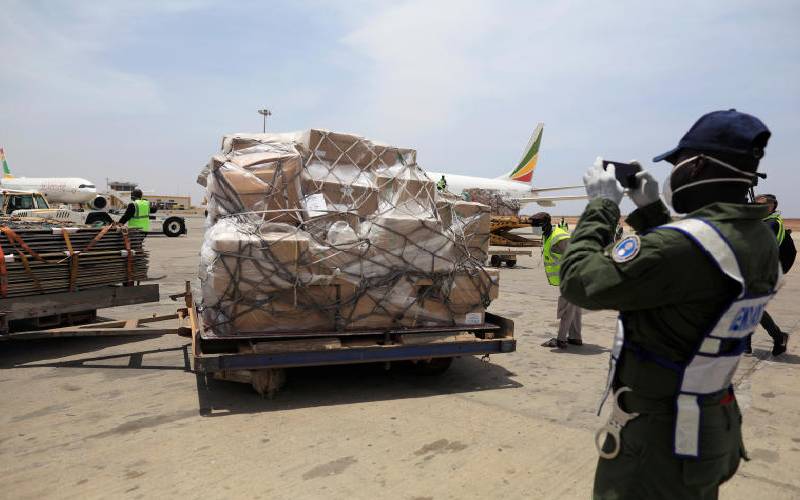
A shipment of medical supplies donated by Chinese billionaire Jack Ma arrives at Blaise Diagne International Airport in Senegal.
The Ministry of Health has started mass testing and fumigating open markets to contain the coronavirus pandemic.
This comes as the pandemic figures shot from 38 on Saturday to 50 on Sunday.
Last week, the government imposed a 7pm to 5am curfew, banned international flights and invoked the Public Health Act 2012 to stem the spread of the virus.
But Kenya is not the only country in Africa and the rest of the world in imposing measures, some that have lain dormant in the law books for decades.
In fact, Kenya might be playing catch-up.
In Abuja, where the first cases of Covid-19 were reported on January 28, 2020, the Nigeria Centre for Disease Control (NCDC) has been investing in epidemic preparedness for the past three years.
The Nigerians first set up Public Health Emergency Operations Centres (PHEOCs) in 23 out of the 36 states back in 2017.
“These PHEOCs help states to detect, prevent, monitor and respond to infectious disease emergencies,” says Ifeanyi Nsofor, the director of policy and advocacy at Nigeria Health Watch.
According to Nsofor, Nigeria’s experience in managing the Ebola outbreak and responding to other infectious diseases such as Lassa fever strengthened the country’s health security capacity and, inadvertently, helped prepare the West African country for Covid-19.
Nigeria went ahead to invest in laboratory diagnoses of coronavirus. Within weeks after the outbreak began, NCDC upgraded four of its reference laboratories to diagnose the virus.
The result are a lesson for Kenya.
“It led to quick diagnosis of an Italian despite his falling ill in a neighbouring state to Lagos. These reference laboratories are located strategically around the country so that delays in moving samples are reduced,” says Nsofor.
The first coronavirus case in Nigeria was reported within 48 hours of the Italian arriving in Nigeria.
The NCDC now has a online platform to provide regular updates to Nigerians and the international community on coronavirus, including videos on risk reduction and summaries of the global situation report.
In Senegal, the country reacted rapidly and firmly to the Ebola outbreak in 2014. The country has put up the Pasteur Institute, a research lab that partners with the World Health Organisation to fight viral outbreaks and is the creator of one of the first yellow fever vaccines.
The Pasteur Institute is teaming up with Mologic, a British biotech firm, to create test kits that can diagnose Covid-19 within 10 minutes. The kits will only cost a dollar each and can diagnose the virus within four hours.
In the United Kingdom, a group of manufacturers will begin producing medical ventilators for the National Health Service in what is being referred to as the ventilator challenge.
The project has several other code names - Oyster and Project Penguin - and has seen the government order 10,000 ventilators for coronavirus patients.
The ventilator challenge has attracted a consortium of 14 firms including Airbus and Rolls Royce.
The UK government has 8,175 ventilators but has turned to British industry to help produce 30,000 in a matter of weeks, to combat an expected surge in new cases.
The industry is also making efforts to produce protective masks and hand sanitisers.
Joint efforts
Earlier this month the UK joined the United States, China, Germany and Israel in the search for a coronavirus vaccine. Scientists at the University of Cambridge found the first coronavirus test candidates in mice.
“Right now we have our vaccine candidates in mice and they’re generating immune responses to the vaccine,” Prof Jonathan Heeney told the BBC.
In South Korea, which has some of the world’s most comprehensive pandemic control measures, tests have been made more available to the public.
A hospital in Seoul has installed coronavirus ‘phone booths’ around its building to offer easy and quick testing for people worried they may have the disease.
This is how it works: One person at a time enters the one side of the glass-walled booth and picks a handset connected to a hospital worker standing on the other side of the glass.
After a consultation, medic wears rubber gloves embedded into the booth to swab the patient quickly, collecting a sample before the booth is quickly disinfected.
The hospital says the seven-minute exam allows it to test almost 10 times as many samples as it did before. The quick-fire test is inspiring more countries, and saving more lives.
In Singapore, the country learnt vital lessons from a SARS outbreak 17 years ago, and developed a robust infrastructure for dealing with pandemics. This was ready when the coronavirus came calling.
All incoming travellers are tested, and so do people entering schools and restaurants. Unlike Kenya, schools remain open although lunch times are staggered so as to avoid mass gatherings.
Potential case’s history
Singapore has the ability to test 2,000 people a day, with 140 contact tracers working with police to outline each potential case’s history. The tests are free, but quarantine is mandatory for those who have had close contact with confirmed cases.
In the US the Food and Drug Administration approved the first rapid coronavirus diagnostic test on March 21, 2020 with a detection time of about 45 minutes. New York, where most cases have been reported in the US, is under lock-down.
 The Standard Group Plc is a multi-media organization with investments in media
platforms spanning newspaper print
operations, television, radio broadcasting, digital and online services. The
Standard Group is recognized as a
leading multi-media house in Kenya with a key influence in matters of national
and international interest.
The Standard Group Plc is a multi-media organization with investments in media
platforms spanning newspaper print
operations, television, radio broadcasting, digital and online services. The
Standard Group is recognized as a
leading multi-media house in Kenya with a key influence in matters of national
and international interest.











